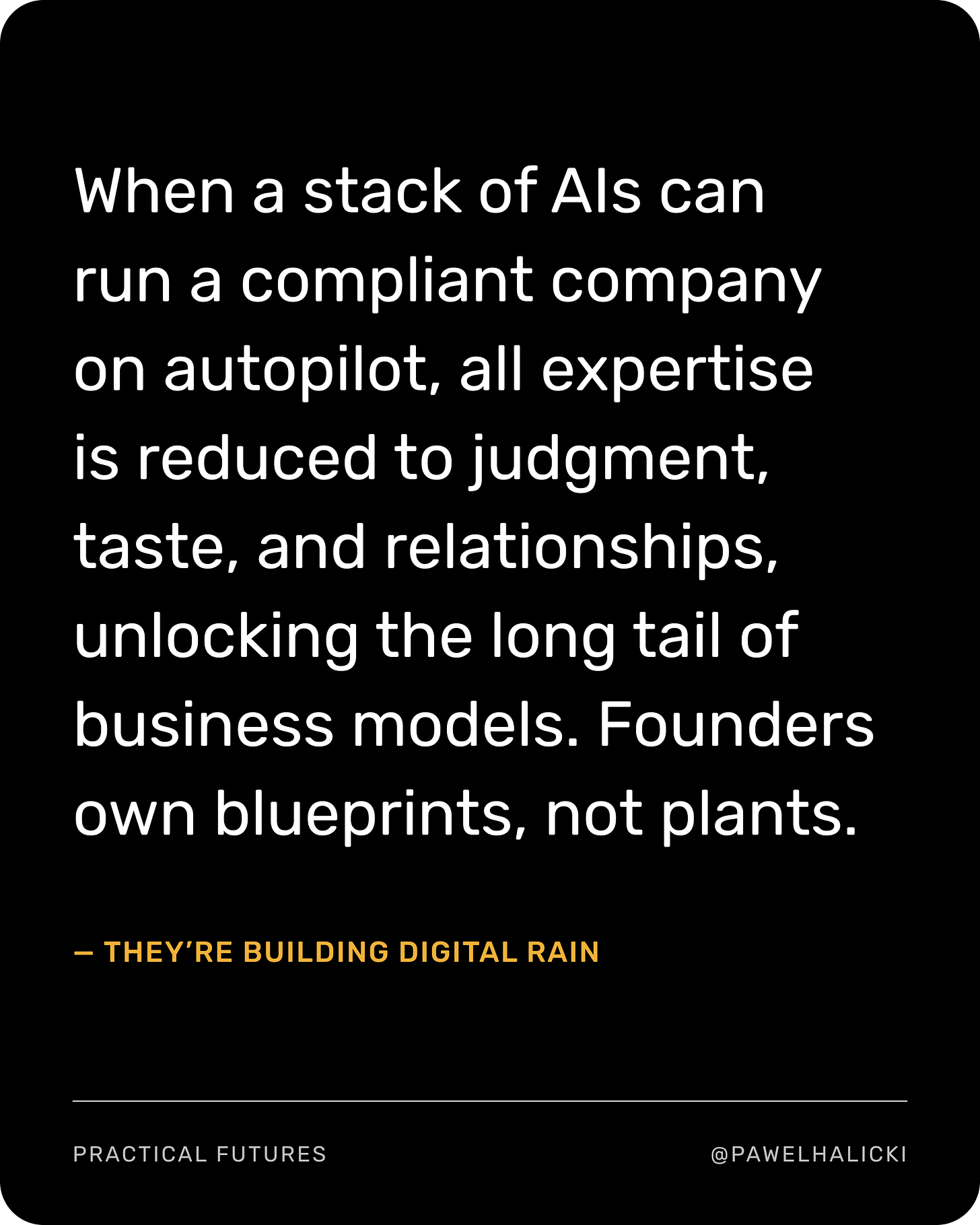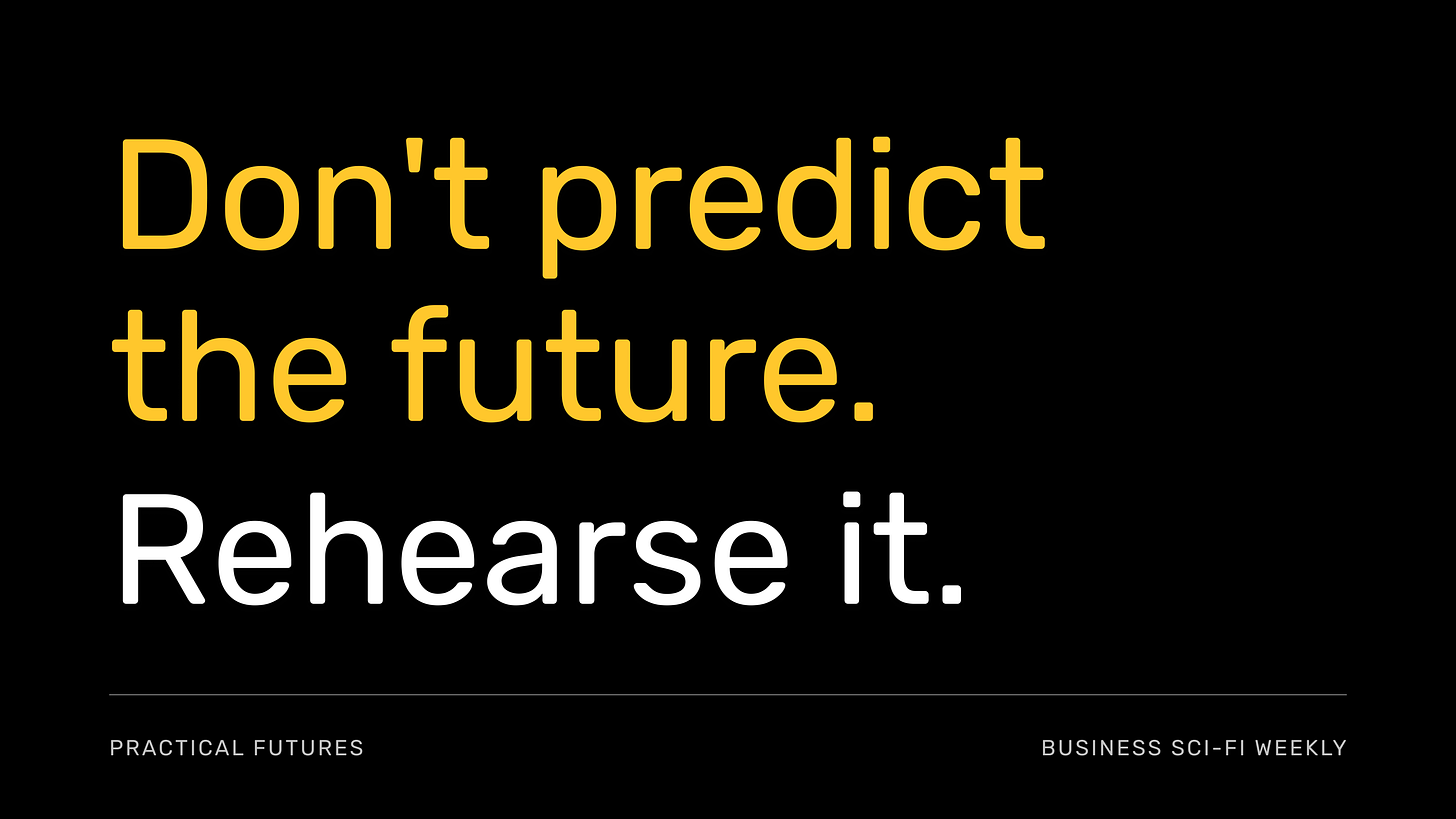They’re building digital rain
Afternoons like this always make her wonder if their couch is big enough to run both their companies.
- My networking mesh has been showing strange correlations since you put your company on autopilot. You joined another board, didn’t you?
A half-guilty smile gives him away.
- The company is on autopilot, so I want to add something new to the stack. Couldn’t pass. The founder has the skills my company needs.
- What are you going to help with?
- They’re building digital rain.
- Interesting, how?
- Oh, yes. They’re flooding urban areas with raw data that must be processed or deflected. The control room that manages those information storms needs a redesign.
- And what are you swapping?
- An intro to a quant who can take my simulation-first contracts platform to the next level. Their founder is great at finding the best advisors.
- You need help to get help. How meta.
- They are growing revenue without scaling the company. I don’t know how, but they certainly know a thing or two about getting the best advisors on board. Soon, most mid-market activity will flow through federations of single-employee companies that assemble like proteins for a job, then dissolve. Perfect moment for my simulation-first contracts to shine.
- And who are you looking for?
- Someone to squeeze efficiency. I’ve been grinding on this for weeks now. In the simulation-first contracts, before signing, both sides run a synthetic operation with anonymised data avatars. The sim runs until key metrics stabilise, and the contract can recalibrate itself to reflect likely reality. So, major data crunching. If we can forecast that stability point early, we will cut sim time and slash costs.
- If they’re growing that fast, aren’t their storms already tuned?
- Yup, and I won’t stop until I get that quant on my board.
She gives the cold coffee one last chance and shudders.
- Brrr. This coffee tastes like it knows I didn’t sleep well. Okay, offline break. Maybe I’ll cook? What do you want for lunch?
- Not sure.
- You’re so indecisive, you should sell a premium hesitation service next. Subscribe for extra doubt.
- Use case? Easy, prevent impulse buys. Huh. That’s actually interesting.
- You’re hopeless.
- Nope. I’m just unstoppable. If the use case is real, market fit is just personalisation at scale. When a stack of AIs can run a compliant company on autopilot, all expertise is reduced to judgment, taste, and relationships, unlocking the long tail of business models. Founders own blueprints, not plants. You see, I have plenty of taste, but I need more judgment.
- What about you cooking lunch? I can be very judgmental.
- Deal. I could also use a break.
He drops the headset on the couch and heads for the open kitchen.
- Just tell me what to do.
- Oh no. Deciding what to start is just as hard as starting.
The fridge welcomes his sigh of defeat by flooding the door display with options.
Memories to build from this future:
1. Reflect on the first month after activating a decision buffer for major purchases and commitments with an attention budget for all notifications.
Which decisions did the buffer pause most often, and what evidence changed your mind?
How did waiting change your confidence and regret?
What decision transitioned from real-time to batch processing and improved quality?
What did you adjust later: wait time or requiring a second opinion?
2. Think back to running your initial simulation-first contract with a major client before signing.
What moment during the simulation showed you the written contract wouldn’t work?
How did the test run change what you negotiated for?
Which metrics stabilised first and gave you confidence that the simulation was accurate?
What problems appeared in the sim that due diligence missed?
How did you justify renegotiating based on something that hadn’t actually happened?
3. Try to recall the first quarter when you shifted from doing work to primarily making decisions while AI handled execution.
When did you realise the organisation valued your choices over your tasks?
How did you decide when to override automation versus trust it?
What new anxiety emerged when your expertise became less about knowledge and more about taste?
How did you keep judgment sharp without engaging with detailed work anymore?
Each memory from the future you build sharpens your strategic instincts for the decisions ahead.
Build enough memories.
Shape better futures.
Know someone who could use more strategic imagination?
Share Practical Futures with your network.





